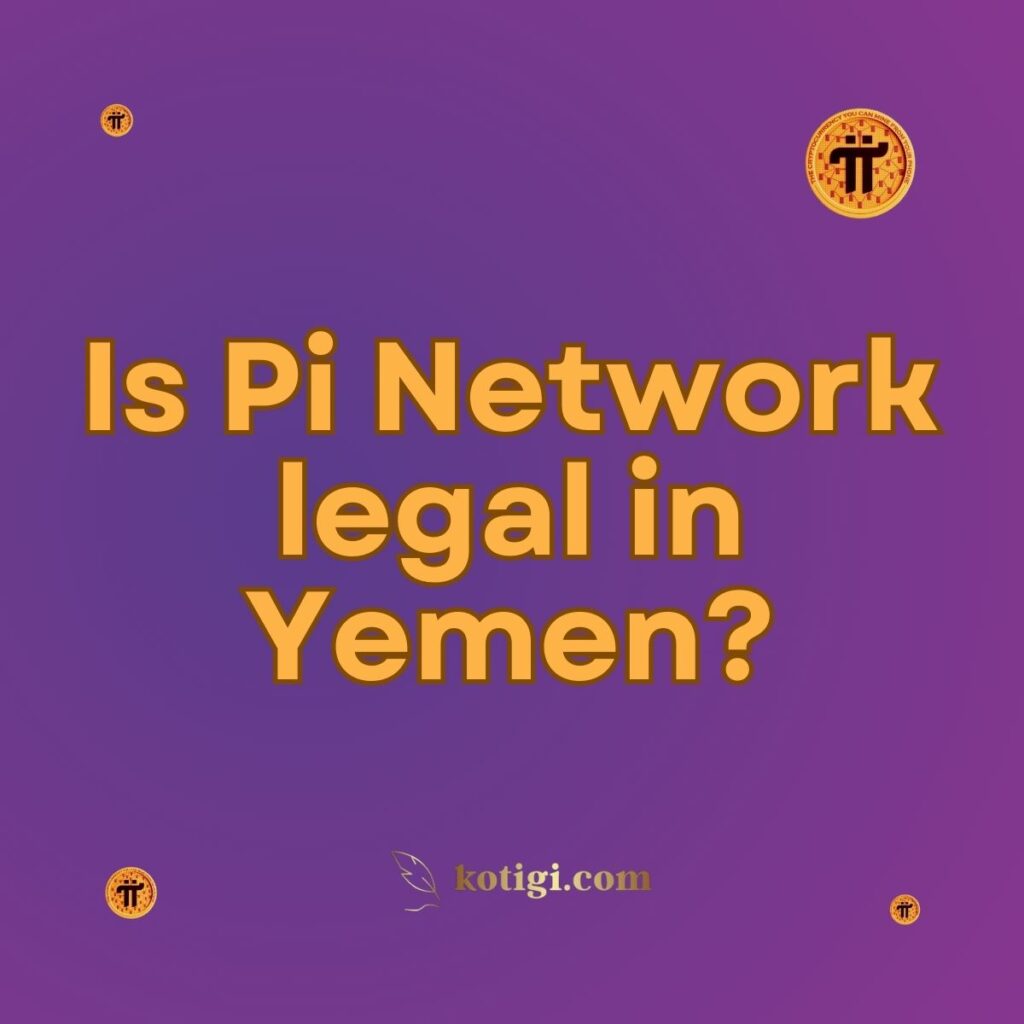
Is Pi Network legal in Yemen?
The legal status of Pi Network in Yemen is currently unclear. While Yemen does not have specific cryptocurrency laws, it faces significant economic and regulatory challenges, which complicate the use and trading of digital currencies. As of now, there are no official restrictions targeting Pi Network directly, but users should stay informed about local and international regulations that may affect their participation in this emerging cryptocurrency.
Introduction
As the popularity of Pi Network continues to spread across different regions, users in Yemen are curious about the platform’s legal standing within the country. Yemen, like many developing nations, has not established clear cryptocurrency regulations due to ongoing political unrest and financial challenges. This leaves many questions unanswered for Pi Network users regarding the legality and risks associated with participating in the network.
In this article, we’ll delve into Yemen’s current regulatory framework, discuss how Pi Network fits within it, and offer important guidance for users considering involvement in Pi Network from Yemen.
Cryptocurrency Regulations in Yemen
Lack of Formal Cryptocurrency Laws
Yemen has yet to introduce specific cryptocurrency regulations, which creates a legal vacuum for projects like Pi Network. The country has been grappling with internal conflicts and economic instability, leaving digital currency regulation on the back burner. This lack of regulation does not necessarily mean that cryptocurrency use is legal, but rather that it exists in a gray area without clear guidelines.
Without clear laws, cryptocurrency activities in Yemen are neither fully legal nor outright illegal, making it crucial for users to stay cautious when engaging with platforms like Pi Network.
Financial and Economic Restrictions
While there are no specific rules banning cryptocurrency usage, Yemen faces significant financial restrictions due to its political climate and international sanctions. These restrictions can indirectly affect digital currencies and may complicate participation in blockchain-based projects like Pi Network.
Yemeni users should keep in mind that the country’s banking system and international connections are limited, which could impact how freely they can engage in cryptocurrency-related activities. While Pi Network is not currently tied to financial transactions, the country’s broader financial environment could pose challenges in the future.
Pi Network’s Position in Yemen’s Legal Framework
Pi Network’s Mobile Mining System
Unlike traditional cryptocurrencies like Bitcoin, Pi Network does not involve financial investment or trading in its current stage. Instead, users “mine” Pi coins through their mobile devices by contributing to the network. This unique model may exempt Pi Network from some of the financial restrictions that affect other cryptocurrencies.
Because there is no exchange of money involved in mining Pi coins at this stage, it might not attract immediate regulatory scrutiny in Yemen. However, this could change when Pi Network enters its open mainnet phase and Pi coins become tradable, leading to greater legal challenges.
Legal Uncertainty
Despite Pi Network’s mobile mining approach, the legal uncertainty surrounding cryptocurrencies in Yemen makes it difficult to predict how authorities might view participation in such projects. Without formal laws, it is hard to say whether the government would eventually crack down on Pi Network or recognize it as a legitimate digital initiative.
For now, Yemeni users should approach Pi Network with caution, especially as the project progresses and the legal landscape around digital currencies continues to evolve.
Legal Risks for Pi Network Users in Yemen
Potential Future Regulations
Although there are no official cryptocurrency regulations in Yemen at the moment, the possibility remains that future laws could be introduced. As the country stabilizes and its financial sector evolves, it may adopt a more formal stance on cryptocurrencies, including Pi Network.
If such regulations are introduced, users who are already participating in Pi Network could find themselves affected. Yemeni users must stay informed about any future developments to ensure they remain compliant with the law as Pi Network matures.
Risk of International Sanctions
Yemen’s involvement in global conflicts and the imposition of international sanctions on the country could also create legal risks for Pi Network users. If Pi Network facilitates financial transactions in the future, participants could inadvertently violate international sanctions. This is a significant concern for Yemeni users, especially those engaging in cross-border transactions.
While Pi Network’s current phase does not involve financial activities, users should be mindful of how the project might evolve and its potential impact on their legal standing in the global arena.
International Perspectives: How Other Countries Handle Cryptocurrencies
Egypt’s Cryptocurrency Ban
To understand the risks that Yemen might impose, we can look to Egypt, a neighboring country with strict rules against cryptocurrency. In 2018, Egypt’s Dar al-Ifta issued a fatwa (religious ruling) declaring cryptocurrency transactions unlawful under Islamic law due to concerns over fraud and illicit activities. Egypt’s central bank also banned cryptocurrency trading and mining.
While Yemen has not taken similar measures yet, the Egyptian stance serves as a cautionary tale for Yemeni users. Without clear guidance from their government, they risk facing sudden legal challenges if Yemen follows Egypt’s lead.
Saudi Arabia’s Regulatory Approach
Saudi Arabia, another key player in the region, has taken a more cautious but open approach to blockchain technology. The Saudi Arabian Monetary Authority (SAMA) has warned against the use of cryptocurrencies but has not banned them outright. This more measured stance could offer hope for Pi Network users in Yemen, especially if the country follows Saudi Arabia’s more moderate regulatory path in the future.
The Future of Pi Network in Yemen
Prospects for Regulatory Development
As blockchain technology continues to grow in global importance, Yemen may eventually introduce a formal legal framework for digital currencies. Pi Network, with its mobile mining model, could find itself better positioned than traditional cryptocurrencies if Yemen adopts more lenient regulations in the future.
While Yemen is far from stabilizing its political and economic situation, the potential for regulatory development remains, especially if the country recognizes the value of blockchain technology.
Staying Informed and Prepared
For Yemeni Pi Network participants, staying informed about both local and international developments is crucial. As Pi Network transitions into its open mainnet, it will likely face greater scrutiny. Yemeni users should be prepared for any regulatory changes and take steps to ensure that they remain compliant with local laws.
Keeping a close watch on announcements from both local authorities and Pi Network’s development team will help users navigate any potential legal hurdles as the project grows.
Conclusion
The legality of Pi Network in Yemen remains uncertain due to the absence of clear cryptocurrency regulations. While there are no explicit bans on Pi Network, the country’s complex financial and political environment poses potential risks for users. As Pi Network evolves and introduces its open mainnet, Yemeni participants should stay cautious and informed to avoid legal challenges.
With time, Yemen may introduce clearer guidelines for digital currencies, but until then, users must exercise caution and remain vigilant regarding any legal or regulatory developments.
Key Takeaways
- No Formal Regulations: Yemen has not established clear cryptocurrency regulations, leaving Pi Network in a legal gray area.
- Pi Network’s Model: Pi Network’s mobile mining approach could shield it from immediate legal concerns, but future phases may attract greater scrutiny.
- Legal Risks: Yemeni users could face challenges if future cryptocurrency regulations are introduced or if international sanctions indirectly impact their participation in Pi Network.
- Regional Examples: Countries like Egypt and Saudi Arabia offer different regulatory approaches, with Egypt imposing a ban and Saudi Arabia adopting a more cautious stance.
- Stay Informed: Yemeni participants should monitor legal updates and prepare for potential regulatory changes as Pi Network progresses toward full functionality.





